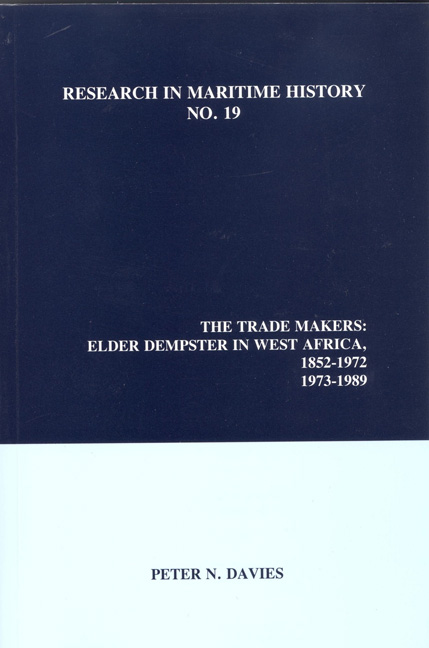Book contents
- Frontmatter
- Table of Contents
- List of Illustrations
- Foreword
- Introduction (Second Edition)
- Foreword
- Preface
- Acknowledgments
- Introduction to the Original Edition
- Frontispiece
- Part One The Pioneers
- Part Two Elder Dempster And Company
- Part Three Elder Dempster And Company Limited
- Part Four Elder Demster Lines Limited
- Part Five The End Of An Era
- 16 A False Dawn and Terminal Decline
- List of Appendices
- Appendices
- Bibliography
- Index
16 - A False Dawn and Terminal Decline
from Part Five - The End Of An Era
- Frontmatter
- Table of Contents
- List of Illustrations
- Foreword
- Introduction (Second Edition)
- Foreword
- Preface
- Acknowledgments
- Introduction to the Original Edition
- Frontispiece
- Part One The Pioneers
- Part Two Elder Dempster And Company
- Part Three Elder Dempster And Company Limited
- Part Four Elder Demster Lines Limited
- Part Five The End Of An Era
- 16 A False Dawn and Terminal Decline
- List of Appendices
- Appendices
- Bibliography
- Index
Summary
The preceding chapter concluded with an analysis of the existing situation in the West African trade and sought to assess Elder Dempster's future prospects. That account, written in 1972, accepted the general assumption that general shipments, both northbound and southbound, would grow in the order of five percent per annum for liner trade products and more rapidly for bulk cargoes. Ore exports, such as alumina and bauxite, zinc, lead and manganese, were forecast to increase by fifteen percent per year, and iron ore was expected to grow even faster. In addition, the prospects for bulk timber and, especially, mineral oil were thought to be quite exceptional. On the other hand, it was generally appreciated the passenger service would continue to decline and that there would be no resumption of sailings to Burma.
At that time, therefore, it appeared on balance that the UK, Continental and American trades with West Africa would continue to grow, thus making Elder Dempster's traditional conference share secure for the foreseeable future. It also seemed probable that the aspirations of the emerging West African National lines could be largely accommodated through the aegis of this expansion. Nevertheless, some concern was already being expressed over rising competition from non-conference operators, the prospect of UNCTAD adopting a “40/40/20 regulation,” and an ever-increasing proportion of West African imports, particularly for Nigeria and Ghana, originating in countries other than the UK.
Yet these misgivings were almost totally offset by the knowledge that since 1965 Elder Dempster had been a wholly-owned subsidiary of what was soon to become Ocean Transport and Trading Ltd. One consequence of this was that the Line was now part of a much larger and financially stronger Group. This in turn ensured that the period after 1965 would mark an era of ever-closer cooperation between Ocean's two main operating companies, Blue Funnel and Elder Dempster. Although this move towards integration had made only limited progress by 1972, one aspect of the amalgamation was already becoming clear: responsibility for policy and strategic decisions, especially those concerned with the allocation of resources, was increasingly being undertaken by Ocean's board of directors.
- Type
- Chapter
- Information
- The Trade MakersElder Dempster in West Africa, pp. 353 - 401Publisher: Liverpool University PressPrint publication year: 2000

